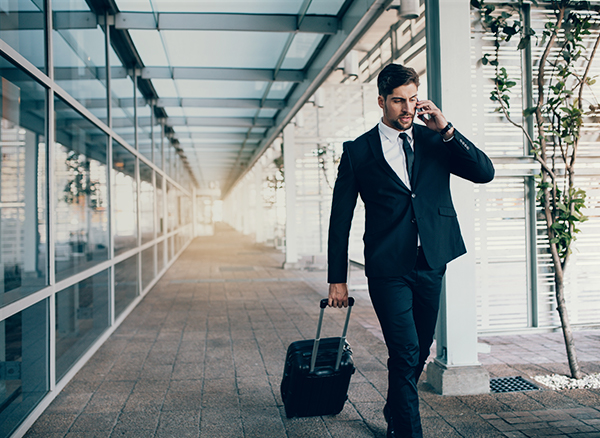

Your guide to travel program evolution (part 3): traveler wellbeing
Featured expert: Dr. Deb Mills, Travel Medicine Alliance
TOP TAKEAWAYS:
- Health and travel recovery time are unique to the individual, so allow additional nights for rest and body clock adjustment
- Consider a formal travel health assessment before departure
- Educating travelers on the importance of tracking, geolocation, and approved suppliers will ensure they see the value of travel programs
Traveling may be more complex in 2022, but it will likely be cleaner and safer than ever.
The pandemic has changed the needs and necessities of how people travel, and the ability to incorporate key stakeholders such as human resources, risk management, legal, procurement, and travel arrangers in travel policy evolution will be key to enabling a safe, confident, and effective return to travel.
Corporate Travel Management (CTM) spoke with Dr. Deb Mills, the Medical Director of the Travel Medicine Alliance, a network of expert travel medicine doctors, to unearth the key traveler wellbeing considerations for both travelers and their employers in the year ahead.
Traveler wellbeing and jetlag
“An individuals’ internal time clock (circadian rhythm), medical history, travel activities and how alert or creative they need to be during their travels is unique, so health routines and travel recovery times are equally unique to the individual,” said Dr. Mills.
The body can adjust naturally to 1 to changes in time zones per day,1 but symptoms can arise when traveling long-haul (6+ hours), crossing five or more time zones in one day.
“The more time zones an individual crosses in a short period, the higher the likelihood of severe jet lag symptoms,” said Dr. Mills. “Business travelers may need to account for a couple of extra nights’ sleep at the destination, and upon return, allow for sufficient body clock adjustment to support wellbeing and ensure they are performing to their best potential.”
Last-minute bookings
According to Dr. Mills, booking travel at the last minute is a common and often avoidable booking behavior that can significantly affect traveler wellbeing.
A recent CTM booking trends analysis showed that the pandemic had influenced a 3-4% increase in last-minute bookings (within 24 hours of departure) for domestic and international bookings during 2020 compared to pre-COVID travel activity in 2019.
In the January to June 2021 period, advanced booking behaviors had begun returning towards pre-pandemic trends, a move which Dr. Mills says will support improved traveler health and wellbeing as business travelers increase their travel activity.
“Don’t book last minute if it can be avoided,” Dr. Mills says. “Travelers need time to mentally prepare for travel and coordinate their personal lives, especially in a more complex travel environment. Last-minute bookings can present adverse health risks, and in some cases will be more costly due to limited availability.”
“The biggest concern I see as a medical professional would be people leaving at short notice and saying they don’t have sufficient time to prepare for their travel health. Most travel health preparations can be undertaken in advance, so that rapid deployment is safe when operationally required,” continued Dr. Mills.

Health assessments
On occasion, businesses may have a requirement to relocate staff overseas or interstate for projects or contract-based work. CTM asked Dr. Mills what health considerations and preparations are required prior to departure and on arrival.
“Depending on the destination and duration of their trip, I recommend business travelers have a formal travel health clearance assessment prior to departure so the company and the travel agent can document that their duty of care has been fulfilled. For relocations, this should include a complete medical examination as well as a vaccine and medication review. For short postings, a vaccine and medication review are usually sufficient,” explained Dr. Mills.
Masks
At the time of writing, wearing masks within airports and aircraft in some countries is federally mandated to reduce the risk of infection. According to Dr. Mills, “The use of ‘fashion masks’ – those that you might wear at home or in places where you can sufficiently social distance – are not best practice for traveling. The use of surgical masks for flying and in transit where social distancing is limited allows the traveler to more closely seal the mask to their face.
“Some authorities recommend people change their mask every 4 hours – this isn’t always practical but should be changed daily at a minimum,” Dr. Mills said. “More frequently is advisable during long-haul flights and could be timed to coincide with meals and refreshments. My personal tip to everyone is to always tear the loops when you dispose of masks to reduce the risk of harm to wildlife in situations where they may become tangled.”
Hotel experiences
When considering preferred suppliers for travel programs, focusing solely on the bottom line is no longer an adequate approach to procurement. In fact, CTM’s 2022 Business Travel Survey showed that the top priorities for travel programs in 2022 were traveler risk, safety, and wellbeing, followed by cost savings and service.
Dr. Mills added, “Travelers need to feel safe, sleep well, eat nutritious food, have space and opportunity to exercise, and a good desk to work at with natural light. Escaping air-conditioning and opting for fresh air ventilation is now of importance, with many travelers seeking accommodation that provides windows that open or balconies. Contactless express check-outs or anything that limits touching surfaces are also other service solutions to consider for your travelers.”
Traveler wellbeing extends past the implications of COVID-19 to areas such as travel policy compliance and risk management.
When business travelers and travel arrangers step outside the approved realms of their travel policy, it can have risk implications for both the traveler and the business. Involving travelers and travel arrangers in the process of risk management planning and procurement, and educating them on the importance of tracking, geolocation, and compliance to approved suppliers will ensure they see value in the travel program and its broader role in traveler wellbeing.
References
[1] Medical News Today – Jet lag: What it is and how to beat it. August 8, 2021.
This blog post is the third in a six-part series of excerpts from CTM’s ebook, A Fresh View to Business Travel 2022. You can download the full ebook here.
Enjoyed learning about corporate traveler wellbeing? Contact CTM to find out more.




